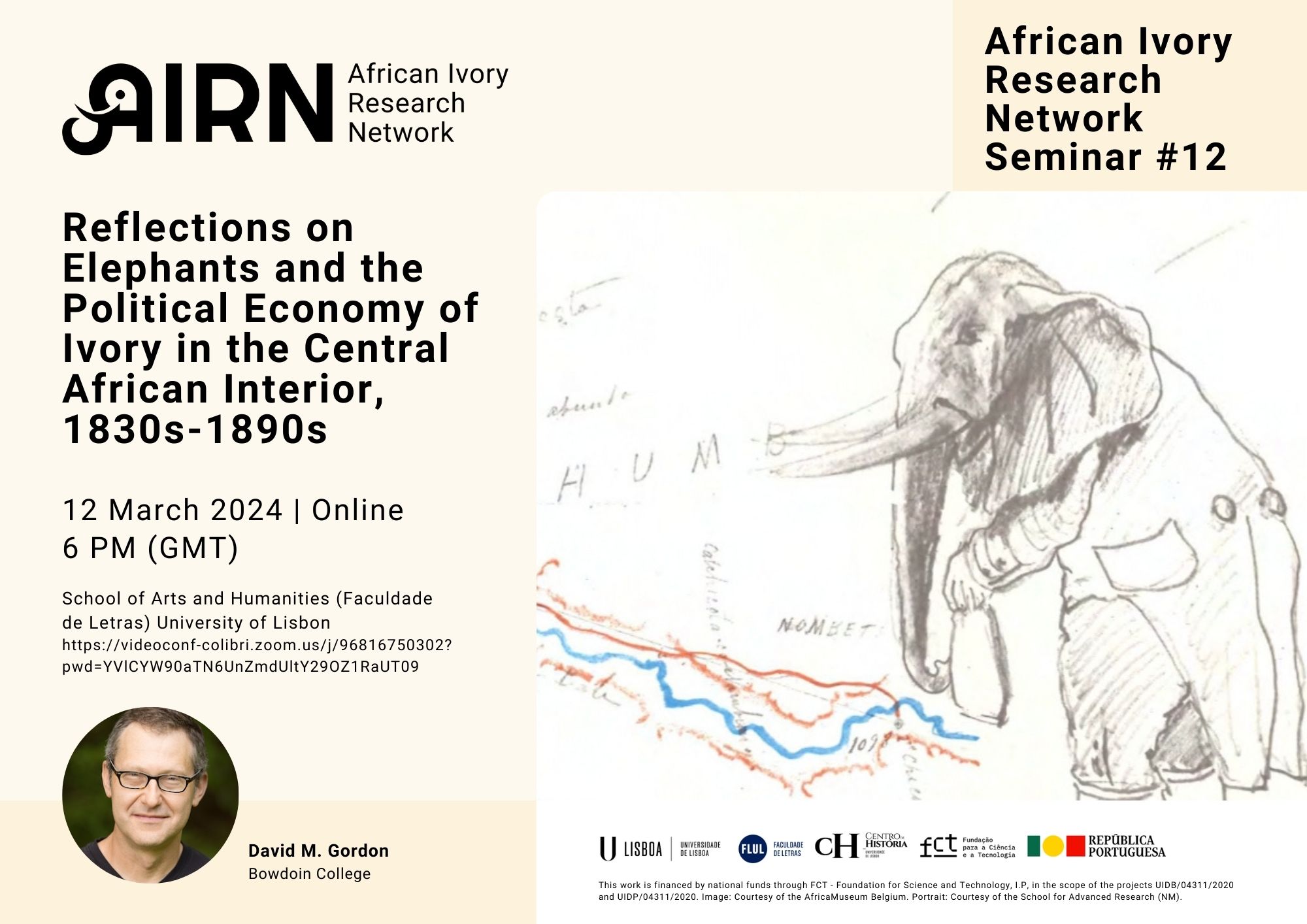AIRN Seminar #12
Reflections on Elephants and the Political Economy of Ivory in the Central African Interior, 1830s-1890s
David M. Gordon (Bowdoin College)
March 12, 2024 | Online | 6 PM (GMT)
Organisation | African Ivory Research Network & Centre for History of the University of Lisbon
Zoom | https://videoconf-colibri.zoom.us/j/96816750302?pwd=YVlCYW90aTN6UnZmdUltY29OZ1RaUT09
ID: 968 1675 0302 | Password: airn2023
Download Poster
Summary: This presentation complements our growing knowledge of the ivory trade from the east and west African coasts by considering the transformation in the political economy of the interior, following the abolition of the Atlantic slave trade and before the European invasion and occupation. This period witnessed not only the growing value of ivory compared to locally produced and imported goods and captives, but also the migration of elephant populations away from coastal areas and to the interior of the continent. Traders followed elephants, transforming established interior political relationships. By comparing the Lunda-Chokwe, the Luso-Ovimbundu, Msiri’s Yeke, and the Arab-Swahili, the presentation discusses the political and economic consequences of elephant killing, ivory production, and trade during this period, offering a view of regional transformations with local differentiations. In the spirit of the animal turn in historiography, the presentation centers elephant-human relationships within this political economy. The perspective offered challenges the notion of ivory as an Atlantic or Indian ocean commodity.
David M. Gordon,Roger Howell, Jr. Professor of History (Bowdoin College), received his undergraduate degree from the University of Cape Town, South Africa, and his Ph.D. from Princeton University.
His research and publications focus on the history of southern and central Africa over the last two centuries, including Atlantic and Indian Ocean trading networks, British, Portuguese, and Belgian colonialism, property regimes, environmental cultures, the historical imagination, spiritual agency, and humanitarianism. His most recent monograph, a history of how spiritual beliefs have influenced human agency, is entitled Invisible Agents: Spirits in a Central African History (Ohio University Press, 2012). He has also edited a collection with Shepard Krech entitled Indigenous Knowledge and the Environment in Africa and North America (Ohio University Press, 2012). Employing select documents used in his course, “Apartheid’s Voices,” he recently published a short history and a collection of documents for the popular Bedford Series in History and Culture, Apartheid in South Africa: A Brief History with Documents.
His first book, a history of fishing, changing tenure rules and forms of wealth from the pre-colonial to the post-colonial periods in the borderlands of Zambia and the Democratic Republic of the Congo, Nachituti’s Gift: Economy, Society and Environment in Central Africa, was published by the University of Wisconsin Press, and was a finalist for the Herskovits award for the best book in all disciplines of African Studies. He has published articles in numerous scholarly journals, edited collections, and digital publications, including the Journal for African History, Journal of Southern African Studies, William and Mary Quarterly, History in Africa, Comparative Studies in Society and History, Slavery and Abolition, Past and Present, Oxford Bibliography in African Studies, and the Oxford Research Encyclopedia.
He is currently involved in two long-term research projects. The first, a culmination of his research in central Africa, uses art and oral tradition alongside archival sources to explore nineteenth century political transformations in the central African interior that were connected with global trade and culminated in the violence of the Congo Free State. The second concerns the struggle for health and human rights in apartheid South Africa, centered around the establishment of a liberated health clinic in the midst of an uprising against apartheid.
Previous AIRN seminars:
#11- Ana Cristina Roque (University of Lisbon, Centre for History): Elephants and ivory: Resources, subsistence, and trade in southeast Africa in the early 16th century (Challenges of using Portuguese written documents) (February 21, 2024)
#10- Yusuf M. Juwayeyi (Long Island University): Emperor Muzura of the Maravi Empire and intensification of International Trade at Mankhamba (January 17, 2024)
#9- Sarah Van Beurden (Ohio State University/School for Advanced Research, NM): Bolobo’s Ivory Carvers (1880s-1980s): Making and Mobilities in Congo (December 13, 2023)
#8- Suzanne Preston Blier (Harvard University): Patterns of Anomaly in African Ivories (November 15, 2023)
#7- William Hart (University of Ulster): Afro-Portuguese Ivories since Bassani and Fagg 1988 (October 25, 2023)
#6- Book Launch: Vanicléia Silva-Santos, Marfins africanos como insígnias de poder. Belo Horizonte: Fino Traço, 2023 (September 27, 2023)
#5- Edward A. Alpers (University of California, Los Angeles): Thinking aloud: Elephants and ivory in Mozambique (May 17, 2023)
#4- Vanicléia Silva-Santos (University of Pennsylvania/Universidade Federal de Minas Gerais): Santo Antônio Ivory Statuettes Attributed to Kongo: Problems with Age and Provenance (April 19, 2023)
#3- René Lommez Gomes (Universidade Federal de Minas Gerais): Ivories on a piece of paper. Notices on Sapi cups and saltcellars in Renaissance Spain (April 5, 2023)
#2- Sarah Guérin (University of Pennsylvania): Ivory trade before and after Henry the Navigator: Shifting worlds (February 15, 2023)
#1- Paul Lane (University of Cambridge): 19th century East Africa ivory trade (Januery 4, 2023)


